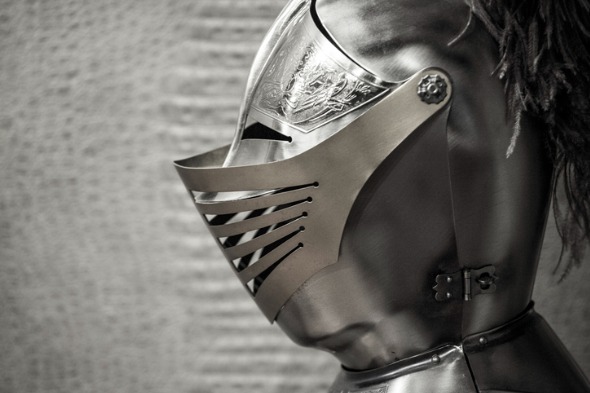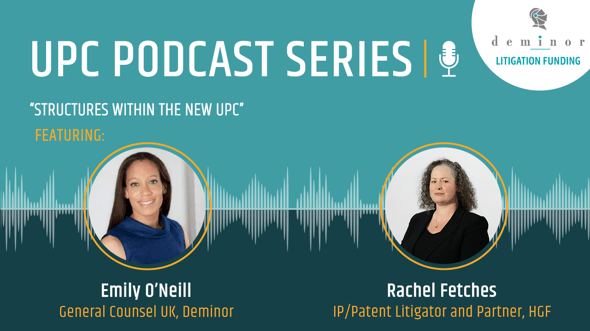In this podcast series, Emily O'Neill General Counsel UK and Global Intellectual Property lead for Deminor Litigation Funding, undertakes interviews with global professionals to understand the implications of the new Unified Patent Court (UPC).
Deminor welcomes you to join this conversation as we summarise the key elements of the conversations between Emily O'Neill and these experts, as captured in the podcast transcripts below.
What is the UPC?
The Unified Patent Court (UPC) is a new European court system designed to harmonise and simplify the patent dispute landscape in Europe.
The UPC was established in order to provide a unified patent enforcement system with jurisdiction over ratifying EU member states. Countries that are Member States of the European Patent Convention (EPC) but are not EU member states cannot join the Unitary Patent or Unified Patent Court. As a unified court with a multi-state jurisdiction, the UPC hopes to be faster, more efficient and more cost-effective in resolving patent disputes.
The UPC's structure is made up of a Court of First Instance that is divided into central, local and regional divisions. Its central divisions are located in Paris and Munich. The third seat of the central division was originally assigned to London. The Italian Foreign Office published a press release that an agreement has been reached with France and Germany to set up a branch of the Central Division in Milan. This agreement now needs to be approved by the other UPC contracting states during the next meeting of the Administrative Committee in June 2023. The press release states that the Milan court is in the process of being set up and will be operational within the next year. In the interim, the Presidium of the UPC decided, that initially, the Paris and Munich central division seats will share this caseload. Cases concerning human necessities are assigned to Paris and those involving chemistry and metallurgy to Munich for now.
The UPC’s Sunrise period launched on March 1st and allowed patentees to opt out of the exclusive jurisdiction of the new system to take effect from the court coming online on 1 June. Approximately 460,000 European patents and patent applications have been opted-out during Sunrise. Opt-outs are still possible now and at least during the 7-year transition period, unless proceedings are pending in the UPC, and will take effect once filed.
However, this is a new and untested forum, located in civil law jurisdictions but with elements of common law such as disclosure, cross-examination and adverse party costs. Notable jurisdictions such as the UK and Spain are not within the UPC - How will companies mitigate their commercial litigation risks in this environment?
Podcast Preface:
Deminor General Counsel UK, Emily O'Neill (EON), speaks with Rachel Fetches (RF), Intellectual Property Partner at HGF. RF advises on contentious intellectual property matters for clients across a broad range of sectors including, life sciences, pharmaceuticals, healthcare, chemicals, food and beverage, aviation, media and telecommunications industries.
In this interview with Emily O’Neill, Rachel provides a huge amount of insight into the upcoming Unified Patent Court (UPC), including her thoughts on the UK’s future relationship with the UPC.
Podcast Transcript:
EON - Who do you think is going to be litigating at the UPC on day one? Who will be shaping this new jurisdiction?
RF - As predicted, I think we'll see non-practising entities, and we've had clear indications that the technology and electronics sector are very keen to use the UPC system.
On the pharma side, we know they are opting out their blockbusters as nobody really wants to risk it at this stage, with the potential to lose a patent in one go.
But it is actually a bit of a mixed picture. Some people are opting out and being really cautious, but on the other hand, we're seeing some of the chemical companies being way more bullish about keeping patents in the UPC and potentially using them.
With Standard Essential Patents (SEPs), quite a few of the companies that we're talking to are going to keep them in. It’s a really big stick to leverage in a licensing discussion if you've got the potential for a pan-UPC injunction.
One of the unfortunate things is that the rationale behind this whole system was to make patent litigation in Europe better, easier and cheaper. It was all for SMEs, who often felt left out in the cold by our current system. Yet what we're seeing is that SMEs are really turned off and are opting out, because they're worried about the risk of being sued within the UPC. So right now, SMEs do not look like they're going to be benefitting from the UPC.
The conversation we're having with clients is, how critical is this particular patent portfolio to the business? Are you able to cope with a central revocation loss? Lots of people are being cautious because even if you feel you've got a strong patent, there is always a litigation risk.
There is a degree of unpredictability right now, in terms of how the UPC will pan out. However, I do think that two or three years down the line, the UPC will become the de facto forum for litigating in Europe. It will be a really important part of the overall litigation strategy for European patents.
EON - What interest have you seen from NPEs in the new Court – an additional tool in a multi-jurisdictional campaign or a way to simplify enforcement in Europe?
RF - I’ll start with the last part of the question. One of the reasons we have adverse party costs in the UPC system is precisely because of this worry about non-practising entities. It’s part of the overall strategy that they've got to take into account. If they're not successful, then they will be looking at costs. That said, it's obviously relative to the value in dispute, and there will be some cost shifting. But it's not quite the same as if they lost in the UK, for example, where they would be looking at quite a big costs award to pay.
In terms of the why, the possibility of the pan-UPC (possibly wider if you look at long-arm jurisdiction) injunction is a big risk, and anyone who says they’re not going to take a licence, will have to weigh that up. And that's really part of the strategic decision-making. There's an awful lot of movement and discussion from the judges indicating that they will be willing to grant injunctions. At a conference a couple of weeks ago, the question was asked to one of the new prospective judges, ‘Will it weigh on you that it's a much bigger economic area that you'll be granting an injunction for?’ And they said ‘No, we're here to look at the legal merits, and, if whoever's coming to us has a good case, whether that's a preliminary injunction, or more likely on the final merits, then we're going to be granting that injunction’. If you're an NPE, you cannot ignore the fact that it will be a huge stick in your licensing negotiations, if you've got the possibility of that sort of injunction.
I also think we'll be looking at layered strategies. Right now, we’ve got bundles of European patents, and if they don't opt them out, they obviously have the ability to litigate, either in the national courts, the UPC, or a mix of both. You could have this sort of Swiss cheese effect where you've got a certain part of an EP bundle being litigated nationally, and perhaps the rest in the UPC. So I think they will still be looking at it in the broader context.
I also think that the UK, as a forum that deals with these sorts of disputes really well, will still be a jurisdiction that people will want to litigate in, as they do now.
EON - You mentioned the role of the UK now that we're not part of the UPC, and you also talked about Standard Essential Patents being kept in. One of the big features of the UK Courts has been setting FRAND rates for global portfolios. What part do you think the UK will play once the UPC is up and running?
RF - At the moment, with different, national patent courts, you could be sued in one jurisdiction, and immediately go to another jurisdiction to almost get a balancing effect. Also, litigants will go to different forums to try and get a well-reasoned judgement from a good, respected court and then ‘shop’ it around other jurisdictions.
The UPC will be different in that respect. The well-respected judges will be there in the UPC, and the only other equivalent in terms of the quality of the proceedings, the judge, and the IP patent knowledge is the UK. So, we think that's potentially what the UK court will be used for, and litigating in both could be an important thing to think about.
When it comes to practitioners, European patent attorneys outside of the UPC countries also have the ability to grandfather in and become UPC representatives. They can also be part of the litigation teams, even if they're not actually UPC representatives working with co-counsel. So, I think the UK will still have quite a lot of influence and involvement in the litigation that's going on in the UPC, particularly because we do quite often manage pan-European litigation, and I think that will continue. The UPC is another jurisdiction that we will have to take into account.
EON - Whilst the high regard held by the UPC's judges bodes well for the UPC as a forum, they're going to be operating under a new set of procedural rules in combinations that are different from their national procedures. How do you think companies and funders can approach predicting outcomes in the first couple of years of the new court?
RF - In some respects, it will be a brave new world. But the way the local and regional divisions, and also the Central Division, for the revocation, declaration and non-infringement, have been structured, is to try and balance out national leanings. There's always going to be an international judge on the panels. In the Central Division, there are going to be multinational panels, and they’re doing an awful lot of training for all the judges, including the ones who are very familiar with patent litigation. If you look at the list of judges that have been appointed, particularly the legally qualified judges, they are very well-known from around the European national patent courts. What’s quite interesting is the way that they seem to be approaching this new system. It’s a toolbox of everything we would normally use, but right now, only parts of it are available in some jurisdictions. With the UPC, we're going to see a very comprehensive toolbox available in a single forum.
And you can see that the judges, in the mock cases I’ve seen, are all learning from each other. It's not just a case of ‘what happens in Germany? Let's do that.’ They’re actually thinking ‘this is a new court. How are we going to do this really well? Can we pick the best bits?’
That doesn't really answer your question in terms of predictability. But I think it does give us a level of confidence that it will be well reasoned, and I expect that we will see some really interesting case law coming out of the UPC, which will have a much more harmonising effect on the national courts than we've seen to date. At the moment, if you have a question about the doctrine of equivalents in five different countries, you've got to go and get five sets of law firms to tell you what each country's national law is on that. I think the UPC will provide a level of harmonisation that we haven't seen before.
EON - As the unitary patent is an expensive right to obtain. Have you seen much interest in the unitary patent? Or do you think that companies are going to continue for now with the EP national route?
RF - We are seeing an awful lot of interest in the unitary patents. It obviously depends on whether you're in an industry or a company that validates widely or not. The pharmaceutical sector is an industry that does validate widely, and we know they're being cautious. Companies that already validate in perhaps 10 to 15 countries are very keen, and they are asking for quotes as to what it will save them in terms of renewal fees going forward. So they are really interested and are looking at it as a cost-saving exercise, by getting 17 countries when it goes live. And at some point going forward, the UPC will cover 24 countries.
What's also interesting is that the vast majority of patents are only valid in a few EPC countries, and one of them is the UK, which you won't get with the UPC. Our clients are telling us that they'll carry on with that strategy for the vast majority of their portfolio, but if they have a key product or portfolio, or they think they’re going to have infringements from people coming into the market and want to increase the territorial scope of their patent, instead of paying for validation in three or four countries, they will get 17 for not much more cost. And that's worth it. So there are an awful lot of commercial considerations coming into it, perhaps more so than the litigation side of things.

EON – How is your firm preparing for the UPC? Will there be different teams of litigators, representing clients at the national level and in the UPC? Or will there be one team? Is the same skill set needed for the UPC and national-level litigation?
RF - We're a mixed firm of solicitors and patent attorneys, both in the UK and in Europe, and from my point of view, it’s most important to think about who the right person is for the team. Who's on the panel? What jurisdiction are we in? Do we have the capability? Do we have the knowledge of the judges in that jurisdiction, particularly where we know there are going to be two nationals, so Germany, France, the Netherlands and Italy?
We really need local counsel, knowledge about those judges, and insight into how that court will be thinking, because the presentation to those judges and the knowledge of that court is going to be really important.
I'm leading my firm's UPC offering, and I've had lots of conversations with European patent litigators and patent litigation firms across Europe. A huge amount of preparation has already gone in, and a lot of firms are keenly aware of the very tough deadlines within UPC litigation, particularly if you're on the receiving end. What we’re seeing is quite a few firms announcing co-counsel offerings. But people are quite rightly interested in the technical strength and depth firms can offer as well. Clients are going to need that alongside legal expertise, and a lot of firms don't necessarily have the required depth of knowledge on every technical subject. So again, it’s important to look at your full team sheet and identify the right person to pull in.
Regarding the timescales, we're used to tricky litigation deadlines, but I think they might be a bit of a shock in some jurisdictions, where you're going from proceedings that take three to four years to much shorter timescales which are front-loaded as well.
EON – Will the 12-month timeline have an impact on the ability of parties to prepare? Could the UPC be more claimant friendly to begin with, because defendants are going to have less time to react?
RF - I think there is a huge advantage to being the one putting in the proceedings. But in scenarios where we're talking to clients about freedom to operate, or we know that they've already seen some kind of correspondence in one of the European jurisdictions, it's also thinking about, if the patentee doesn't opt this patent out, and decides to litigate in the UPC, are we ready? It’s about having the technical ability. If you're a claimant, and you've already got your expert evidence ready, the pressure will definitely be on defendants. And we can see that the court is very keen on not extending unless there's a very good reason.
.jpg?width=590&height=393&name=businesspersons-hand-calculating-invoice-in-office.jpg_s=1024x1024%26w=is%26k=20%26c=TnNKaX4U1H3vvSQOAwOEbqC1IHNjU00Es46miGbbEJs=%20(1).jpg)
EON – Does the UPC have a protective letters procedure, like Germany?
RF - Yes, and the fact that you can put in a protective letter will be a really important part of the UPC. Currently, anyone who is worried about being sued in Germany, the Netherlands, or the few other places that accept them, can put their arguments down on file and it's confidential until you get sued. In reality, it is to stop you from being injuncted on an ex parte basis, although that's unlikely to happen unless you're a bad actor. Putting in a protective letter is a bit like a dance. You want to put enough in the protective letter to say, ‘Call me to court and give me a chance to defend this’, without being so comprehensive that the courts don't need to call you in because they can already see all your arguments. But yes, protective letters can be really important if you're worried about being sued.
EON – One area that funders are always very interested in is the economics of a case and the potential for the UPC to have a wider damages pool than national litigation in Europe. Do you think that in the early years, there will be bigger damages available, or do you think we need to wait for the unitary patent to be granted before we see larger damages awards?
RF – The two most attractive elements for patentees are the injunction and what you can get in terms of damages. But with bundles of national patents under the EP system, it depends where it's validated, and how widely it's validated.
When it comes to the unitary patent, you are looking at a much wider territorial area. The way that the damages provisions have been set up is to effectively marry the Enforcement Directive, as is the case across all of the national patent courts now.
How will damages be calculated? And what will the judgments look like? All the commentary says that the UPC will have a number of different national traditions to draw on, so we might get some who are unlikely to give too much and others who are actually quite generous. Obviously, there's no punitive damages, so there's no kind of wilful element. It remains as it is currently in Europe.
Another thing that the UPC will have to look at is the extent to which they will award damages in relation to someone who claims to be an innocent infringer. There are a lot of questions that will need to be worked out on damages, and the scope of damages. We know the general principles that will apply, i.e., it will be an offer that incorporates reasonable royalties, accounting profits etc.
If you look at the damages procedure in the UPC, there's an ‘opening the books’ procedure which will be a very powerful tool for a patentee to use, assuming they'll do the substantive work on the merits first, and then go on to the damages procedure, although you don't actually have to do that.
But yes, I think we’re a lot more likely to see significant damages once we get into UPs being litigated.
EON – I’ve heard about the concept of long-arm jurisdiction for the UPC. Given that the UK is no longer part of the system, what does that actually mean?
RF – I think this is one of the things that will be litigated.
In terms of setting up the UPC as a sort of supranational court across a number of member states, the Brussels Regulation, which manages the interaction between different courts has been amended, and a long-arm jurisdiction has been given to the UPC. That means the UPC has jurisdiction over defendants that are domiciled outside the EU, which they refer to as third states, for infringements of European patents within the EU.
"We know that the English judges are huge proponents of this system, and they want it to work well. But clearly, part of the reason why the UK left the EU is to remove itself, and we didn't proceed with UPC in order to remove ourselves from the jurisdiction of the Court of Justice of the European Union." - RF
Where they've got jurisdiction over defendants in third states, which does include the UK, in cases of European patent infringement giving rise to damages within the EU, then there is a further long-arm jurisdiction, where the UPC may, and I use the word may, exercise jurisdiction in relation to damages arising in the third state. So we're talking about damage in the UK, for example. There are a couple of caveats to that. The defendant has to have property within the UPC countries. And there has to be a ‘sufficient connection’ test with the action that's going on in the UPC states. So there are quite a few provisos, but in theory, if you had a defendant that was headquartered in the Netherlands, and had multiple branches around Europe, including some in UPC countries, and perhaps one in the UK, can the UPC, if there's a finding of infringement, order them to stop infringing? The way that the penalty would work is that if the UK subsidiary continued to infringe, then they would penalise the Dutch company through fines.
So that's sort of the starting point, if you were doing protective measures, preliminary infringement, for example. And with the provisional and preliminary measures, there is a proviso that the UPC can enforce that, even if the third state (the UK in this example) had jurisdiction over the substance of the matter. So the issue is, perhaps you can find the Dutch company, but can you actually come to the UK court and say, ‘We want you to enforce this order against a UK company’, when the order has been made by the UPC court? That's the part that's unclear.
We know that the English judges are huge proponents of this system, and they want it to work well. But clearly, part of the reason why the UK left the EU is to remove itself, and we didn't proceed with UPC in order to remove ourselves from the jurisdiction of the Court of Justice of the European Union. So if I was defending the person who's on the receiving end of that, I'd be trying to get an anti-suit injunction to stop that order being made. But we don't know how this will play out. We know that companies are looking at scenarios like these, and I think people want to test it, so I think we will definitely see cases that will give us a clearer idea about the actual reach of the long-arm jurisdiction.
EON – Are you excited about the UPC?
RF – It’s the biggest change in a generation, and we have to see it as an opportunity. I think in the first couple of years it will be for companies that are willing to take a risk, because there will be an awful lot of challenges, and litigators testing the boundaries. But in three years to five years, I think it will be a really successful court.

RF – From a litigation funder perspective, how attractive is the UPC for you? Are there any different considerations you would need to see in the proposals coming to you for potential funding for UPC cases?
EON – I think the UPC has the potential to be very attractive. But it's all going to depend on predictability, who's there and what assets are there. So the opt-out question and how broadly patents have been validated will have a direct impact on potential damages. Economic considerations, as well as merits, are really important for litigation funders, so when we assess a case, we look at whether it’s strong on its merits. But we also look at whether the investment is going to be economically viable. We know that the costs of litigating in the UPC will be more expensive than, for example, a German national action, and initially, probably more expensive than it will be after a couple of years once the system is embedded. So the damages will need to be sufficient enough that funding a case makes sense commercially, for us, the client and the law firm.
"I think the other consideration for us is predictability - what are the outcomes going to look like? Is the time period really going to be a year, which is quite a short timeframe?" - RF
I think the interesting thing about the UPC is that some countries enable fee agreements and contingency fees, and in other countries, they’re not permissible. So for example, in Germany, a contingency fee is not available. And those litigators will be competing in the same court with others who are able to work on a contingency fee. So it's going to be interesting to see forum shopping of law firms to represent organisations in the new court.
I think the other consideration is the adverse party costs. So obviously, there are adverse party costs in some European jurisdictions, again, Germany is a good example. They have statutory costs against awarded on a set scale. The UPC costs will also be against a scale by value, but the level of cost is much higher than is generally seen in Germany. So from our side, we want to see what kind of insurance is available in the market. ATE or ‘after the event’ insurance is very London-centric, so if the case has a nexus to London if it's a UK company litigating in the UK, the market for ATE is much broader than for cases which have no UK nexus.
Additionally, because that insurance market is so London-centric, following Brexit, some insurers now don't have a licence to insure in Europe. So it'll be interesting to see how the market develops to cater for these adverse party costs, and the ability to mitigate that risk.
I think the other consideration for us is predictability - what are the outcomes going to look like? Is the time period really going to be a year, which is quite a short timeframe? It’s potentially plaintiff-friendly, which from our side is positive because funding is usually for claimants.
But can we look at the attitude and approach of the national jurisdiction and apply that in the context of the UPC? Are we going to be able to successfully assess the risk of investing in cases in the first few years? Or is it going to be too high risk?
I think, from our side, broad damages potential could be interesting, depending on the specific case. The fact that some of the judges are well-known is interesting. And while the different concepts that make up the UPC are already known from the different jurisdictions that have inputted into the UPC agreement, but how that actually plays out is a definite question mark. We're quite excited but also slightly terrified of an early phase investment in the UPC.

UPC Podcast Series - Next steps and further information:
Thanks for joining Deminor's UPC Podcast Series as we deep dive into the ins and outs of the new Unified Patent Court.
Keep a look out for our upcoming interviews as Deminor General Counsel UK and Global Intellectual Property lead, Emily O'Neil, speaks with several more experts to get their insights on the UPC.
If you would like to connect with either Emily or Rachel Fetches on LinkedIn, please click on the links below:
Deminor, General Counsel UK and Global IP lead - Emily O'Neill
HGF, Partner and Intellectual Property/Patent Litigator - Rachel Fetches
***
Further Reading:
- https://www.deminor.com/en/case-studies/co-funder-proposes-sharing-of-litigation-funding-risk-to-leverage-deminors-in-house-due-diligence-capability
- https://www.deminor.com/en/case-studies/financing-assertion-of-patents-protecting-manufacturing-processes
- https://www.deminor.com/en/case-studies/telecoms-patent-assertion-multi-jurisdictional-campaigns
- https://www.deminor.com/en/case-studies/canadian-innovative-start-up-preparing-for-a-david-v-goliath-litigation-funding-battle
- https://www.deminor.com/en/case-studies/whats-the-risk-assessing-the-risk-of-counter-assertion-by-the-defendant-in-patent-litigation
- https://www.deminor.com/en/case-studies/overstepping-the-mark-litigation-funding-trade-mark-infringement
- https://www.deminor.com/en/case-studies/lights-camera-action-recovering-damages-for-infringement-of-rights-in-a-short-film
- https://www.deminor.com/en/case-studies/recovering-damages-for-stolen-software-through-litigation-funding
- https://www.deminor.com/en/case-studies/funding-in-the-pharma-sector-/-investing-in-a-case-where-litigation-is-already-ongoing






